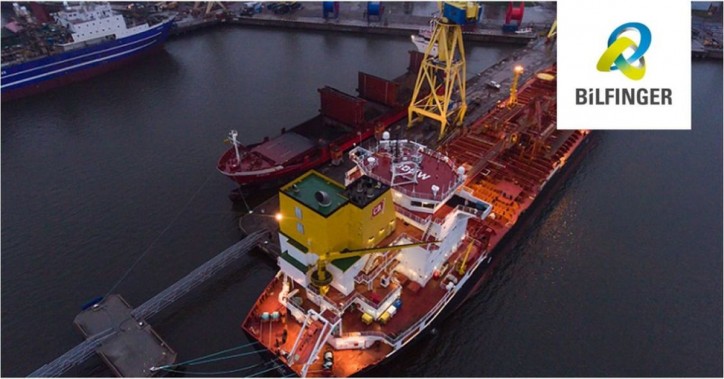- Freighters and tankers to be fitted with flue-gas scrubbers
- Contracts with a value in excess of 40 million euros
- Scrubber technology has huge market potential
The industrial services provider Bilfinger is conquering new markets thanks to its scrubber technology. In the past weeks alone, the group secured contracts from several Greek maritime shipping companies to fit out at least 42 vessels with so-called ‘scrubbers.’ These are flue-gas-desulphurisation systems that filter out sulphurous exhaust gases by means of a special absorption process. The total contract value amounts to more than 40 million euros. The maritime shipping companies commissioning the work were Maran Tankers, Anangel Maritime, Delta Tankers, and Marmaras Navigation. Engineering & Technologies is the division looking after these contracts.

Tom Blades, CEO of Bilfinger, explained: ‘More and more enterprises are becoming interested in environmental technologies – now on the water as well. We have decades of experience with flue-gas desulphurisation, and we are now carrying our know-how over to the high-seas shipping industry. Deploying our “Made in Germany” technologies will allow us do our part to help ensure that ships comply with the new thresholds and that the sea air remains clean.’
The international maritime shipping industry must comply with significantly stricter environmental requirements. Most vessels currently are fuelled by heavy oil, which comprises a share of more than three percent of sulphur. The International Maritime Organisation (IMO) has moved to address the problem: Starting in 2020, the sulphur content of fuel is to be officially limited to 0.5 percent all over the world. As an alternative, IMO and the European Union are permitting exhaust gases to be desulphurised using flue-gas cleaning systems, so-called scrubbers. This reduces the sulphur dioxide concentrations in the exhaust gas emitted by heavy oil to the same significant degree achieved by the use of low-sulphur fuels (marine diesel and LNG), which are very expensive by comparison.
Excellent market potential
Michael Löffelmann, Executive President of the Engineering & Technologies division: ‘These contracts serve as excellent references and will open doors to additional projects in the maritime sector. Given that scrubbers are a practically competition-free product whose cost can be depreciated over one to two and a half years, we expect to see vigorous demand for our solutions. The many new orders in our book also validate the approach we have taken to transpose our unique expertise in the field of industrial plant and equipment to other growth sectors.’
Bilfinger’s scrubber solutions offer an all-in-one service package, including development, fabrication, and maintenance. Maritime-shipping clients can also select from a number of different scrubbing processes. Given that the newly introduced thresholds will affect roughly 50,000 vessels, the market potential for Bilfinger’s self-developed scrubber solutions is huge.
For two years now, Bilfinger has been on a successful track in this field. Take the maritime shipping firm Carl Büttner, for example, whose vessels have been riding the waves in a more environmentally-friendly way thanks to new flue-gas-desulphurisation systems installed in the fall of 2016. This showcase project was recognised with the International Air Pollution Prevention Certificate by the certification company DNV GL.
Source: Bilfinger